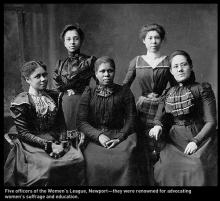We hear quite a bit about the plight of black Southern women during and after slavery. We know that they were discriminated against, given the worst possible jobs and relegated to systematic poverty. Why is it that movies like The Help portray black women as the most sought after maids in the city? But was it really so much better in the northern United States during this same period? Let’s learn a bit more about black women in the north:
Slavery created the idea that black men and women needed separate spheres of work and division of jobs to provide the division between men and women necessary for them to create children. This division applied to black women in the north, as well. Women typically continued the trades that they or their mothers perfected while they were enslaved—sewing, spinning, nursing, entertaining and cooking.
In the 1820’s and ‘30’s, black women immigrated to what came to be called Freedom Cities, or cities with high populations of black people. Boston, New York and Philadelphia were three immigration hot spots. Black women hugely outnumbered black men in these cities—from a census taken in Philadelphia in the 1840’s, the ratio was 16 black women to 5 black men—because the need for domestic labor provided by black women was high.
Nearly every black woman in the north worked in the service industry. Black women were domestics, seamstresses, washer women and dressmakers. A few owned their own shops, but many more were street vendors that would hock their wares on the mean streets. The majority were household workers in the homes of rich northerners—imitating almost exactly the duties and getting the same respect level as they did on the southern plantations.
As time went on, since black women performed similar duties as the ones they did during the times of slavery, people began perceiving these domestic and service duties as black women’s natural abilities. They began to be confined to these occupations because that was what their blood made them able to do. Every black woman could be a cook or servant and only needed a little training.
Some black women worked with their husbands on abolition campaigns, correspondence and publishing. Others headed ladies’ abolition organizations. Still, this didn’t mean that they stepped outside of the arenas appropriate for women at this time in history. Black women were always assigned duties like cooking and letter writing.
One of the saddest and most ironic elements of the whole system was the way that black women were perceived in the north. They were black women, but they were also women and at that time, women were only perceived as moral if they worked within the home. Black women, single or with families, needed to work outside the home and therefore were perceived as immoral. Ironically, this worked both to keep women within the home—they wouldn’t want to be perceived as immoral—but also opened up a larger job pool for black women looking for work in white homes.
